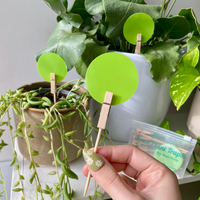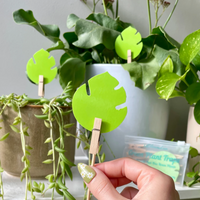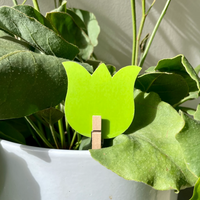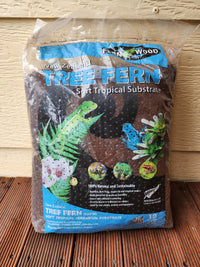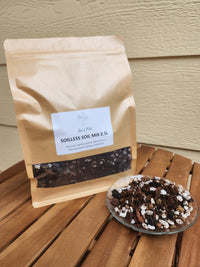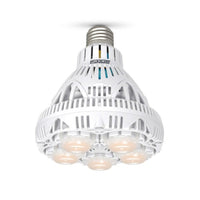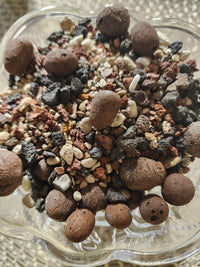Hey plant lovers! Today, we're going to tackle a not-so-pleasant but super important topic in the world of indoor gardening: pests. Yes, those tiny uninvited guests that sometimes make their way onto our beloved plants. But fear not! I'm here to guide you through preventing these little critters and, if necessary, showing them the door in the kindest, most plant-friendly way possible.
Understanding Common Indoor Plant Pests
Before we dive into the solutions, let's get to know our tiny adversaries. The most common pests you might encounter are aphids, spider mites, mealybugs, and fungus gnats. Each has its own quirky ways, but they all share a love for your green friends.
Prevention: The First Line of Defence
Prevention is always better than cure, right? Here are some simple steps to keep pests at bay:

Keep 'Em Clean: Regularly wipe down your plant's leaves using our We The Wild Protect Spray. This product is specially formulated with a pet-safe blend of Neem Oil and beneficial microbes. This is not only keeping your beloved plant shiny and dust-free, but it also provides comprehensive protection against various pests and diseases.
Quarantine New Plants: Rule of thumb, whenever you bring a new plant home, keep it separate from your plant family for a few weeks. This helps to ensure it's not harbouring any pests that could spread.
Proper Watering and Lighting: Believe it or not, a well-cared-for, healthy plant is less likely to attract pests. So, make sure you're giving your plants the right amount of water and light.
Regular Inspections: Inspect, inspect, inspect…Make it a habit to inspect your plants regularly. Look under the leaves and near the stem for any signs of pests.
Natural Treatments: Gentle Yet Effective
If you do find pests, don't panic! There are several gentle, natural methods to tackle them:

Neem Oil: Neem Oil is a naturally occurring insecticide that's derived from the seeds of the neem tree. It's an effective and natural way to kill bugs on houseplants or battle insects and pests in the garden. Neem oil messes with the brains and hormones of the bugs, so they stop eating and mating and will eventually die off. This natural oil works wonders against a variety of pests. In a spray bottle, simply mix 7.5ml of Neem oil, 5 ml mild dishwashing liquid with 1 litre of lukewarm water and shake well. Spray the whole plant with the neem mixture covering both the top and bottom of the leaves and the stems. Keep away from direct sunlight until the leaves dry (always test 1-2 leaves prior). For infestation, spray every fortnight. As a preventative spray once a month.
Insecticidal Soap: Mix a mild soap (Dr Woods dishwashing detergent is highly recommended) with lukewarm water and gently spray it onto the affected areas. In a spray bottle, simply mix 60ml of dishwashing detergent with 1L of lukewarm water. Keep your plant out of direct sunlight until the leaves are dry (remember to test 1-2 leaves prior).
Rubbing Alcohol: A cotton swab dipped in Hydrogen Peroxide or any other rubbing alcohol can be effective, especially against mealybugs. Simply dip your cotton swab into the Hydrogen Peroxide, then dab the mealybug with it. You will find the mealybug will easily come off onto your cotton swab.
Diatomaceous Earth: Diatomaceous Earth, often just called DE, is a fascinating substance that's great for organic pest control in your indoor garden. It's made from the fossilised remains of tiny, aquatic organisms known as diatoms. Their skeletons are made of a natural substance called silica. DE is a fine, white powder that's non-toxic to humans and pets but deadly to insects. It works by absorbing the oils and fats from the exoskeleton of insects, causing them to dehydrate and die. It's effective against a wide range of pests, including aphids, ants, bed bugs, and cockroaches. Before applying to your plant, make sure to wear a mask (because it's a fine powder) and lightly dust the soil and the leaves of your plants. A makeup or paint brush is perfect for this. Remember, DE is a slow acting, but very effective, method of pest control. It might take a little time to see results, but it's a safe and natural way to protect your plants!

Dealing with pests can be a bit of a hassle, but with these tips, you're well-equipped to keep your indoor garden thriving and pest-free. Remember, the key is regular care and early intervention. Happy gardening and here's to healthy, happy plants!


